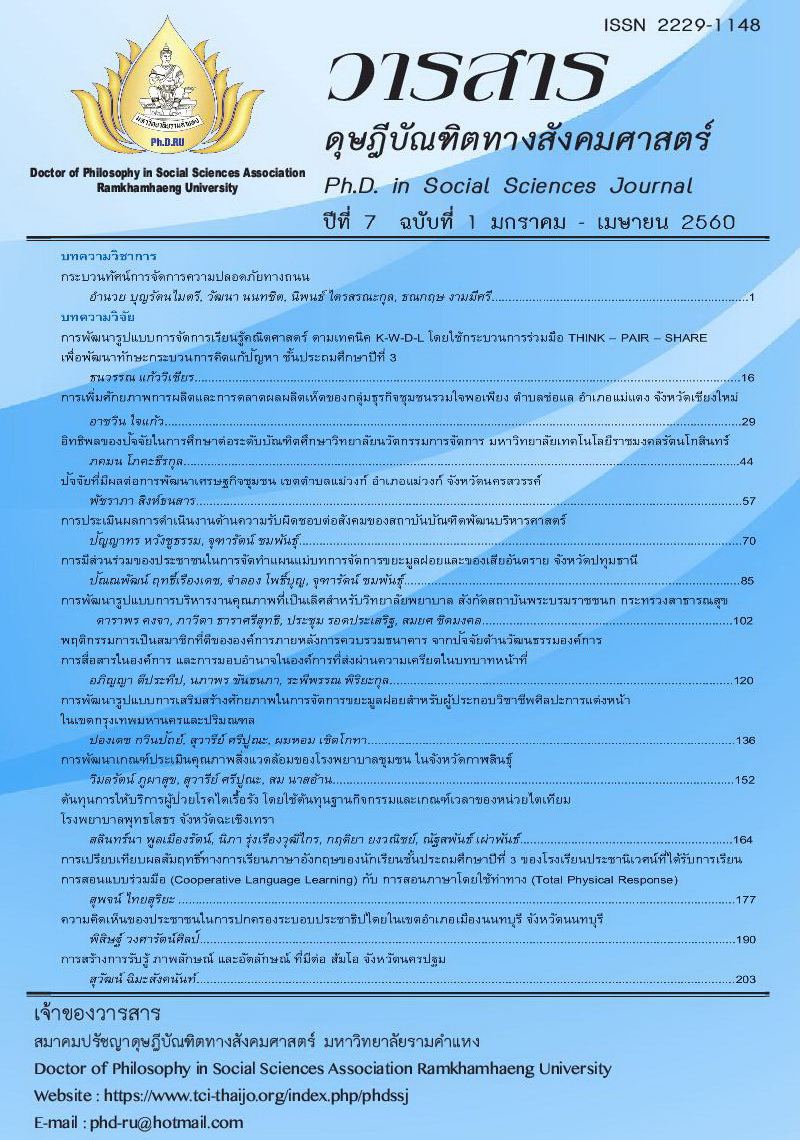การพัฒนารูปแบบการจัดการเรียนรู้คณิตศาสตร์ ตามเทคนิค K-W-D-L โดยใช้กระบวนการร่วมมือ THINK – PAIR – SHARE เพื่อพัฒนาทักษะกระบวนการคิดแก้ปัญหา ชั้นประถมศึกษาปีที่ 3
Main Article Content
Abstract
การพัฒนารูปแบบการจัดการเรียนรู้คณิตศาสตร์ ตามเทคนิค KWDL โดยใช้กระบวนการร่วมมือ Think–Pair–Share เพื่อพัฒนาทักษะกระบวนการคิดแก้ปัญหาชั้นประถมศึกษาปีที่ 3 โดยมีวัตถุประสงค์ (1) เพื่อศึกษาสภาพการจัดการเรียนรู้คณิตศาสตร์ (2) เพื่อสร้างและพัฒนา (3) เพื่อทดลองใช้ (4) เพื่อประเมินและปรับปรุง รูปแบบการจัดการเรียนรู้คณิตศาสตร์ ตามเทคนิค KWDL โดยใช้กระบวนการร่วมมือ Think–Pair–Share เพื่อพัฒนาทักษะกระบวนการคิดแก้ปัญหา ผลการวิจัยพบว่า
สภาพข้อมูลพื้นฐานการจัดการเรียนรู้คณิตศาสตร์ ควรปรับปรุงด้านกระบวนการจัดการเรียนรู้ เนื่องจากมีนักเรียนอ่านหนังสือไม่คล่อง จึงเป็นอุปสรรคในการเรียนรู้คณิตศาสตร์ ควรส่งเสริมนักเรียนโดยจัดกิจกรรมการเรียนรู้ที่เน้นให้นักเรียนได้ลงมือปฏิบัติ จะช่วยให้นักเรียนได้เรียนรู้และฝึกทักษะกระบวนการคิดอย่างยั่งยืน
ผลการสร้างและพัฒนารูปแบบการจัดการเรียนรู้คณิตศาสตร์ ตามเทคนิค KWDL โดยใช้กระบวนการร่วมมือ Think–Pair–Share เพื่อพัฒนาทักษะกระบวนการคิดแก้ปัญหา เป็นการจัดการเรียนรู้ที่เน้นนักเรียนเป็นศูนย์กลาง นักเรียนสามารถเรียนรู้จากการปฏิบัติงาน นักเรียนวางแผนการทำงาน คิดแก้ปัญหาที่เกิดจากการทำงาน ฝึกการทำงานร่วมกับผู้อื่นได้ ครูผู้สอนเป็นผู้เสนอแนะแนวทางการเรียนรู้เพิ่มเติมด้านเนื้อหา เพื่อให้นักเรียนเกิดการพัฒนาทักษะกระบวนการคิดแก้ปัญหา ประกอบด้วย หลักการ วัตถุประสงค์ ขั้นตอนการจัดการเรียนรู้ กิจกรรมการเรียนรู้ การวัดประเมินผล และประโยชน์ เรียกว่า การจัดการเรียนรู้แบบ STELE Model
ผลการทดลองใช้รูปแบบ พบว่า นักเรียน ชั้นประถมศึกษาปีที่ 3 ปีการศึกษา 2557 มีผลการพัฒนาทักษะกระบวนการคิดแก้ปัญหา สูงกว่าก่อนเรียน อย่างมีนัยสำคัญ .01
ผลการประเมินและปรับปรุงรูปแบบ พบว่า นักเรียน ชั้นประถมศึกษาปีที่ 3 ปีการศึกษา 2558 มีผลการพัฒนาทักษะกระบวนการคิด สูงกว่าก่อนเรียน อย่างมีนัยสำคัญ .01 และผลจากครูคณิตศาสตร์ที่นำรูปแบบการจัดการเรียนรู้แบบ STELE Model ไปใช้มีผลการประเมินระดับมากที่สุด
THE DEVELOPMENT OF A LEARNING MATHEMATIC MODEL BASED ON KWDL TECHNIQUE USING THINK–PAIR–SHARE COOPERATIVE LEARNING TO DEVELOP THINKING SKILL IN PROBLEM SOLVING AT THE PRATHOM SUKSA THREE
In this research and development (R&D) inquiry, the researcher examines basic information concerning the learning of Mathematic in order to study the state of the underlying data of Mathematic learning management for creating and developing a model of KWDL technique using Think–Pair–Share cooperative learning for enhancing thinking skill in problem solving. Also, to try using, to assess and to improve a model of KWDL technique using Think–Pair–Share cooperative learning for enhancing thinking skill in problem solving, the findings showed that
Findings are as follows:
In examining the conditions under which basic Mathematic information is learned, the researcher found that learning organization should be improved because of struggling readers. It would be expedient to use authentic task in gathering accurate data collection for the sake of fostering awareness of the need for sustainable learning and thinking skills.
In constructing and developing the learning Mathematic model, the focus fell on student-centeredness. Learners can learn Mathematic through undertaking tasks. Learners planned their own work, solved problems resulting from striving to carry out work tasks, and directly practiced working with others. Teachers can play a role by providing guidance in carrying out learning activities in addition to making suggestions concerning contents to the end of encouraging learners to develop their thinking skills in problem solving. The model consisted of principle, objectives, teaching methodology, activities, evaluations and benefits. It is called STELE Model.
The results of the trial, assessment and improvement of KWDL Technique with Think – Pair – Share cooperative learning for enhancing thinking skills in problem solving of the Prathom Suksa Three students in 2014 and 2015 were as follows: Their thinking skills in problem solving were higher after the completion of the study than prior to the study at the statistically significant level of .01. The teachers who utilized this model in their classroom exhibited evaluation at the highest level.
Article Details
Academic articles, research articles, and book reviews in the Ph.D. in Social Sciences Journal are author’s opinions, and not the publisher’s, and is not the responsibility of the Ph.D. in Social Sciences Journal Philosophy Association, Ramkhamhaeng University. (In the case that research is done on human, the researcher has to be trained in Ethics for Doing Research on Human Training and has to produce the evidence of the training).


